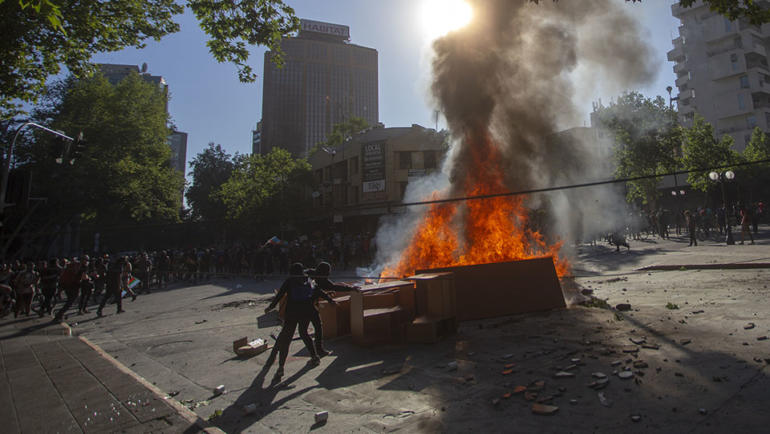It started as a protest over rising prices on the local metro in Santiago. It’s now evolved into Chile’s largest display of social discontent in decades.
President Sebastian Pinera faces the lowest approval ratings of any Chilean president since 1990, and many Chileans are calling for a new constitution.
CGTN’s Joel Richards reports.
Three weeks since protests erupted, there’s no sign that Chileans are letting up.
Tuesday’s march quickly escalated into violence. There’s no visible leadership behind the demonstrations, only widespread discontent.
The protests are not about just one issue, but rather a series of issues, from pensions to health, education, and the cost of living. But three weeks on, the question is what happens now.
How does Chile move forward from these protests?
“Many of the demands have been in the political agenda for decades and have not been transformed into public policy,” said Claudia Heiss from the University of Chile. “I think that is why people don’t trust traditional political institutions and parties, and that is why I think a constituent assembly could be a way to overcome this problem and to create a new legitimacy that articulates these demands.”
Meetings like this are taking place across Chile as many government opponents complain the constitution is failing to provide basic rights.
The organization Social Unity is coordinating these nationwide meetings and said more than 10,000 people have already taken part.
Twenty-eight-year-old surgeon Cesar Salazar said most Chileans support the idea of a structural change in Chile’s economy.
“These are the largest marches in Chile’s history. Never have so many people come out to protest. Never has it been clearer that there is a whole country that wants to change how we live,” said Salazar.
Many groups want to replace the 1980 constitution which was written during the time of former Chilean President Augusto Pinochet.
Sebastian Pinera’s government has announced measures to address social and economic demands, including an increase in minimum wage.
But many Chileans now want more than small changes in policy.
 CGTN America
CGTN America
 Demonstrators clash with security forces during a protest against the government’s economic policies in Santiago, on November 6, 2019. – Chile’s president said Wednesday his government had “nothing to hide” concerning allegations that police killed, tortured and sexually assaulted civilians during deadly protests against him as protesters called on demonstrators to expand their rallies to rich districts so far untouched by the wave of demonstrations, centering on a major shopping center. (Photo by CLAUDIO REYES / AFP)
Demonstrators clash with security forces during a protest against the government’s economic policies in Santiago, on November 6, 2019. – Chile’s president said Wednesday his government had “nothing to hide” concerning allegations that police killed, tortured and sexually assaulted civilians during deadly protests against him as protesters called on demonstrators to expand their rallies to rich districts so far untouched by the wave of demonstrations, centering on a major shopping center. (Photo by CLAUDIO REYES / AFP)
